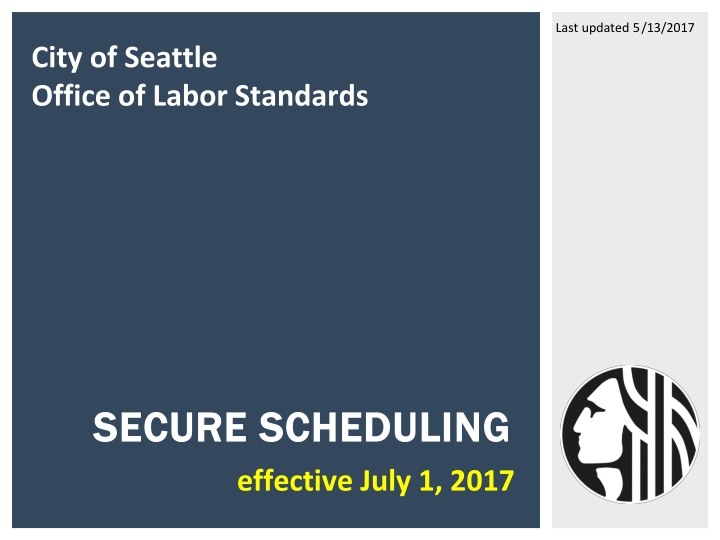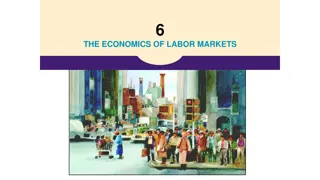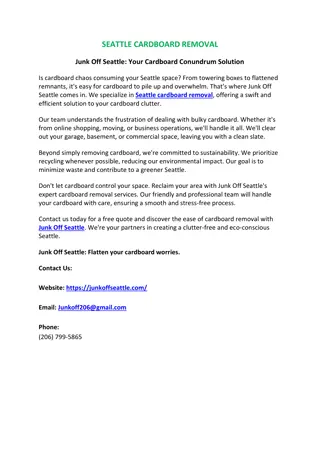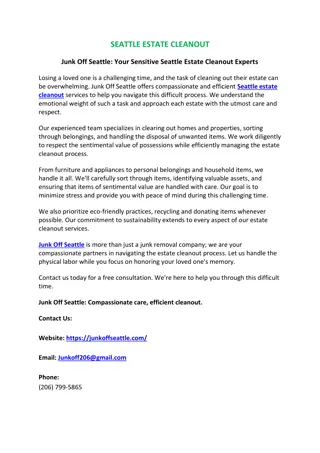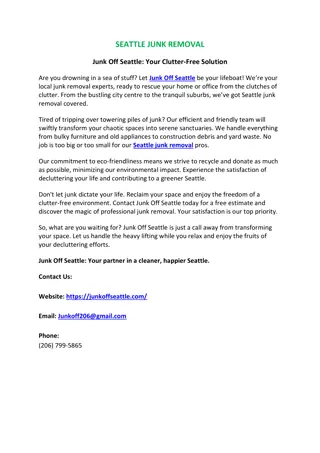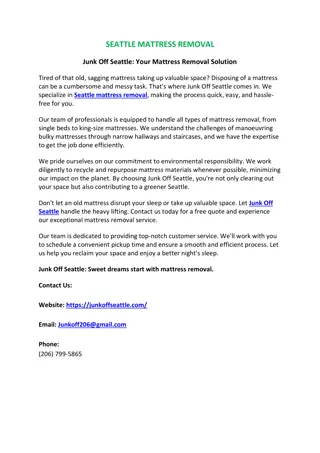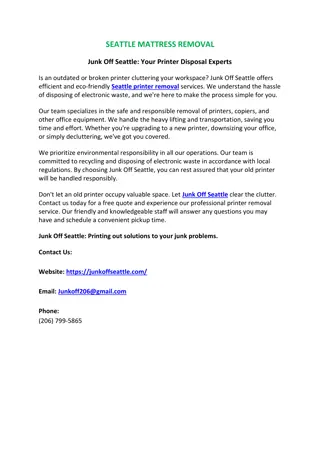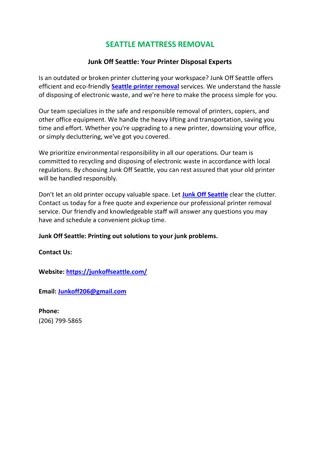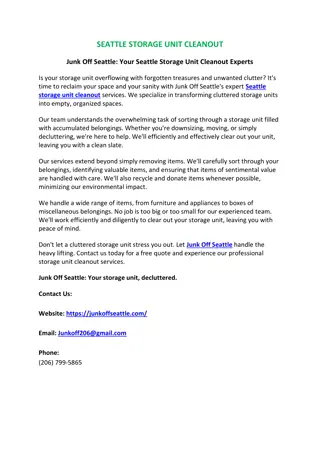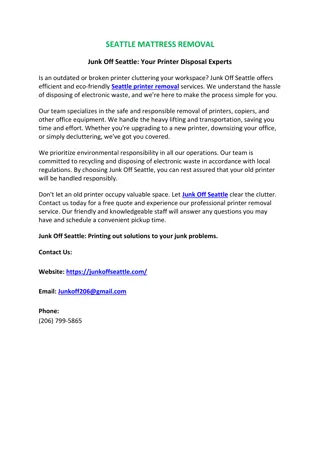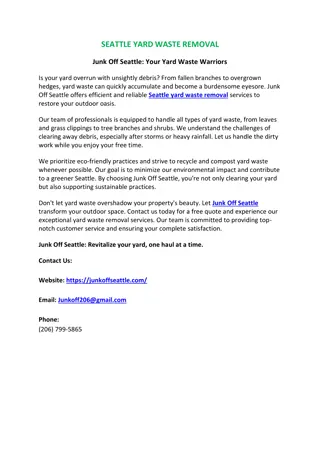Seattle Labor Standards and Secure Scheduling Overview
Office of Labor Standards in the City of Seattle aims to advance labor standards through community engagement, enforcement, and policy development with a focus on social justice. Secure Scheduling initiative effective from July 1, 2017, brings predictable schedules, employee input, and economic security.
Download Presentation

Please find below an Image/Link to download the presentation.
The content on the website is provided AS IS for your information and personal use only. It may not be sold, licensed, or shared on other websites without obtaining consent from the author.If you encounter any issues during the download, it is possible that the publisher has removed the file from their server.
You are allowed to download the files provided on this website for personal or commercial use, subject to the condition that they are used lawfully. All files are the property of their respective owners.
The content on the website is provided AS IS for your information and personal use only. It may not be sold, licensed, or shared on other websites without obtaining consent from the author.
E N D
Presentation Transcript
Last updated 5/13/2017 City of Seattle Office of Labor Standards SECURE SCHEDULING SECURE SCHEDULING effective July 1, 2017
OLS MISSION Our mission is to advance labor standards through thoughtful community and business engagement, strategic enforcement and innovative policy development, with a commitment to race and social justice.
SEATTLE LABOR STANDARDS 1. MINIMUM WAGE 2. WAGE THEFT 3. PAID SICK AND SAFE TIME 4. FAIR CHANCE EMPLOYMENT 5. HOTEL EMPLOYEE HEALTH & SAFETY 6. SECURE SCHEDULING
BUSINESS QUESTIONS Darius Foster, Business Liaison 206-386-1238 Darius.foster@seattle.gov Kerem Levitas, Business Liaison 206-386-9758 Kerem.levitas@seattle.gov Karina Bull, Senior Policy Advisor 206-684-4536 Karina.bull@seattle.gov
OLS ON-LINE Web http://www.seattle.gov/laborstandards OLS Monthly Dashboard Data on outreach & enforcement, 2012 to present http://www.seattle.gov/laborstandards/data Secure Scheduling Summaries, infographics, links to ordinance & rules Q&As, Templates, Trainings, List of Covered Businesses
SECURE SCHEDULING SECURE SCHEDULING effective July 1, 2017
Predictable schedules that work. New secure scheduling practices for Race & social justice Employee health, safety and welfare Greater economic security Increased employee input into scheduling; and Reduced involuntary part-time work.
LARGE FOOD SERVICES & RETAIL Large food service & retail employers Retail = 2012 NAICS code 441-453998 Food Service = 2012 NAICS code 722 500+ employees worldwide Full Service Restaurants = additional requirement for 40+ full-service restaurant locations worldwide NAICS Code = North American Industry Classification System Employers must list the NAICS code when registering for a City of Seattle business license.
NAICS CODE http://www.seattle.gov/licenses/find http://www.seattle.gov/licenses/find- -a a- -business business
SCHEDULING REQUIREMENTS 1. Good faith estimate of work schedule 2. Right to request input into work schedule 3. Right to rest between work shifts 4. Advance notice of schedule 5. Compensation for schedule changes 6. Access to hours for existing employees
GOOD FAITH ESTIMATE Employer provides written estimate of median number of hours and on-call shifts.
GOOD FAITH ESTIMATE 1. Employer provides written information. Median number of hours per work schedule (over the course of one year divided into three-month periods); and On-call shifts. New employees. Provide GFE at time of hire. Existing employees. Revise GFE once every year and when there is a significant change (difference of at least 30% over a three month period) between median hours in GFE and advance work schedule. Translations required. Provide GFE in English and primary language of the employee. 2. 3. 4.
EXAMPLE GOOD FAITH ESTIMATE 1. Hire date: January 1, 2017 2. Median number of hours over the course of the year Year begins January 2017 Quarter One (January March) 20 hours Quarter Two (April June) 20 hours Quarter Three (July September) 20 hours Quarter Four (October December) 35 hours 3. On-call shifts Yes No
RIGHT TO REQUEST Employee can request schedule preferences prior to posted work schedule.
RIGHT TO REQUEST 1. 2. 3. Employee can request specific times and locations of work. Employer must complete interactive process within 3 weeks. Employer can ask for verifying information. Must inform employee of ability to redact private information. Employer has increased obligations for requests due to major life events. Must grant such requests unless the employer has a bona fide business reason for denial. Must provide a written response when granting or denying the request. 4.
MAJOR LIFE EVENT Important, serious or significant event related to the employee's access to the workplace due to Changes in employee's transportation. Changes in employee s housing. Employee's own serious health condition. Employee's responsibilities as a caregiver. Employee's enrollment in a career-related educational or training program. Employee's other job or jobs.
BONA FIDE BUSINESS REASON Significant & identifiable burden of additional costs. Significant & identifiable detrimental effect on ability to meet organizational demands A work schedule change that requires an employer to pay additional compensation under a law or written policy (e.g. holiday pay). An action causing employer to violate a bona fide collective bargaining agreement or a seniority system in a written policy; An action causing the employer to displace one or more employee(s) from an existing work schedule arrangement.
RIGHT TO REST Employer provides additional pay for clopenings separated by less than 10 hours.
RIGHT TO REST 1. Clopening - Employee works closing and opening work shifts. 2. Employee request or consent - Employer can only schedule clopenings separated by less than 10 hours upon employee request or consent. 3. Additional pay (i.e. premium pay ) - Employer must pay 1.5x the scheduled rate of pay for hours worked that are less than ten hours apart. 4. Exception - Additional compensation does not apply to split shifts.
ADVANCE NOTICE OF WORK SCHEDULE Employer provides work schedule 14 days in advance.
EXCEPTIONS ADVANCE NOTICE OF SCHEDULE Exceptions for new and returning employees Employees with a work schedule change. New employees at time of hire. Transfers, promotions, and new job classifications. Employees who are jointly employed (e.g. employees provided by a staffing agency, contractor, subcontractor, or other employer); and Returning employees from a leave of absence.
PAY FOR SCHEDULE CHANGES Employer provides additional pay for employer-requested schedule changes (with some exceptions).
PAY FOR SCHEDULE CHANGES 1. Additional pay (i.e. premium pay ) Adding hours = Payment for one hour at the scheduled rate. Pro-rated payment allowed for schedule changes that are less than one hour. Subtracting hours (including on-call shifts) = Payment for half the hours not worked. Grace period = 15 minutes.
EXCEPTIONS PAY FOR SCHEDULE CHANGES Employer DOES NOT provide additional pay for certain schedule changes.
EXCEPTIONS PAY FOR SCHEDULE CHANGES 1. Employee-requested changes 2. Shift swaps 3. Mass communication 4. In-person group communication 5. Access to hours 6. Discipline 7. Operations cannot begin or continue
EXCEPTIONS PAY FOR SCHEDULE CHANGES Mass communication Employer-initiated, written message sent to two or more employees about availability of additional hours due to a scheduled employee not being able to work. Required information - Each mass communication must convey 1. The message is a mass communication; 2. Accepting the offer of additional hours is voluntary and the employee has the right to decline such hours; and 3. Accepting such hours does not require the employer to pay additional compensation for work schedule changes.
EXCEPTIONS PAY FOR SCHEDULE CHANGES In-person group communication Employer-initiated, discussion with two or more employees about availability of additional hours due to unanticipated customer needs. Hours must be consecutive to current shift. Required information - Each in-person group communication must convey 1. Accepting the offer of additional hours is voluntary and the employee has the right to decline such hours; and 2. Accepting such hours does not require the employer to pay additional compensation for work schedule changes.
ACCESS TO HOURS Before hiring new employees (including temporary employees) employers must offer additional hours of work to current employees.
ACCESS TO HOURS Three + Two Days 1. Notice of Hours Three days - Employer posts written information about additional hours in noticeable place at worksite for all employees on the payroll 2. Job Offer Two Days - Employer offers job to qualified, current employee(s) and allows two days to consider offer.
EXCEPTIONS - ACCESS TO HOURS Employer can immediately hire new employees in certain situations.
EXCEPTIONS - ACCESS TO HOURS 1. Written declination from all existing employees 2. Written declination from employees on access to hours list(s) Access to hours list = Written list of employees who receive notice of additional hours available for work. All employees are automatically on the list & can ask to be added or removed at time of hire or during employment. Employer must make list available for viewing to employees upon request. 3. Hiring programs = Hours of work that the employer has designated for hiring programs (e.g. diversity, supported employment, young adult programs) affiliated with a government entity or external non-profit organization that has been approved subject to the rules of the Director.
OTHER REQUIREMENTS 1. Record keeping 2. Notice and posting 3. Protections against Retaliation 4. Waiver 5. Employees who are jointly employed
RECORD KEEPING 3 YEARS 1. Good faith estimates 2. Right to request Employer s grant or denial of employee s request for schedule preferences, prior to posted schedule, related to major life event. 3. Advance notice of work schedules 4. Compensation for work schedule changes - Payroll records showing additional compensation paid to each employee. 5. Exceptions to compensation for work schedule changes Mass communications. Documentation of employee-requested changes. Documentation of employee discipline. 6. Access to hours - Notices for additional hours of work. 7. Exceptions to access to hours Written confirmation from employees Confirmation from all employees, or employees on the access to hours list, that they are not interested in accepting additional hours of work. Access to hours list(s) - Records of employees who have opted out of receiving written notice of additional hours of work.
NOTICE & POSTING Display SS workplace poster (coming soon) English and employee s primary language(s) Download from OLS website https://www.seattle.gov/laborstandards/outreach Pick-up from OLS & Seattle Customer Service Centers
NOTICE & POSTING Translations 1. Employers translate the following documents Good faith estimate. Advance notice of work schedule. Notice for access to hours. Workplace poster. 2. OLS creates poster and provides templates for translations
RETALIATION 1. Protections from retaliation Employers may not interfere with any employee right protected by the ordinance. Employees have the right to decline any hours not on the posted schedule. Discipline permitted for certain situations Abuse of employer s requirements for employee-requested work schedule changes and/or preferences PRIOR to posted work schedule; and Failure to comply with, or abuse of, employer s requirements for employee-requested work schedule changes AFTER the posted work schedule. 2.
WAIVER Waiver allowed in CBA 1. Express waiver - Waiver must be expressly stated in a collective bargaining agreement; and 2. Alternative scheduling structure - Employees must ratify an alternative scheduling structure that meets public policy goals of ordinance
EMPLOYEES WHO ARE JOINTLY EMPLOYED Special requirements for employees who are jointly employed: Temporary services provider Staffing agency Contractor Subcontractor Other employer(s)
EMPLOYEES WHO ARE JOINTLY EMPLOYED 1. Joint liability - Joint employers are individually and jointly responsible for compliance. 2. Good faith estimate - Employers provide a good faith estimate when such employees start each distinct assignment. 3. Advance notice of work schedule - Employers may immediately place such employees on posted work schedules without providing 14 days of advance notice. 4. Pay for work schedule changes - Employers provide additional pay for each work schedule change after such employee has started a distinct assignment. 5. Access to hours - Employers are not required to provide notice of additional hours of work to such employees if they are not on the employer s payroll.
ENFORCEMENT 43 43
SOFT LAUNCH Six months July 1, 2017 to December 31, 2017 OLS determines remedy owed to employees. OLS supports employer compliance. OLS does not impose civil penalties/fines - except for egregious violations (i.e. retaliation).
PRIVATE RIGHT OF ACTION Remedy Up to 3x unpaid wages Up to $5,000 to aggrieved party for retaliation Attorney Fees and Costs
INVESTIGATION Protection of Identifying Information Company-wide Investigation (standard) Individual Investigation (retaliation) Complaint-based Directed
VIOLATION(S) REMEDY OR PENALTY First Violation Up to 3x unpaid wages + interest Subsequent Violations Mandatory 3x unpaid wages + interest First Violation Up to $500 per aggrieved party Up to $1000 per aggrieved party or 10% of unpaid wages, whichever is greater Second Violation Up to $5,000 per aggrieved party or 10% of unpaid wages, whichever is greater Third Violation Subsequent Violation Up to $20,000 per aggrieved party Chart of Fines $500 to $1,000 fine Reinstatement or up to 3x front pay; up to $5,000 to aggrieved party Retaliation Settlement & Mitigation of Penalties Director Discretion
CHECKLIST Good Faith Estimate - Employers provide median number hours and whether employee will work on-call shifts. Employer provide GFE at time of hire, annually, and when there is a significant change. Right to request input into work schedule - Prior to the posted work schedule, employees can identify work schedule preferences. Employers must engage in interactive process with employee & grant requests related to major life event unless there is a bona fide business reason for denying the request. Right to rest between work shift - Employees earn 1.5x scheduled rate of pay for hours worked that are less than 10 hours between a closing and opening work shift. Advance notice of work schedules - Employers provide 14 days advance notice of schedules. Exceptions for new and returning employees.
CHECKLIST Additional Pay for work schedule changes Additions = Payment for one hour of pay at scheduled rate. Subtractions = Payment for half the length of work shift that was cancelled or the remaining hours of a work shift that was shortened. Exceptions for employee-requested changes, mass communications, etc. Access to hours for existing employees Hiring protocol = Before hiring new employees (including temps), employers must offer addt l hours of work to current employees. Employers must post notice of addt l hours for three days and allow existing employees two days to consider job offers. Exceptions for receipt of written declination from employees, use of access to hours list, and diversity hire programs. Record keeping - Three years. Notice and posting Workplace poster and certain translations. Waiver - Collective bargaining agreement can waive requirements. Employees must ratify an alternative scheduling structure that meets policy goals.
seattle.gov/laborstandards laborstandards@seattle.gov 206-684-4500
